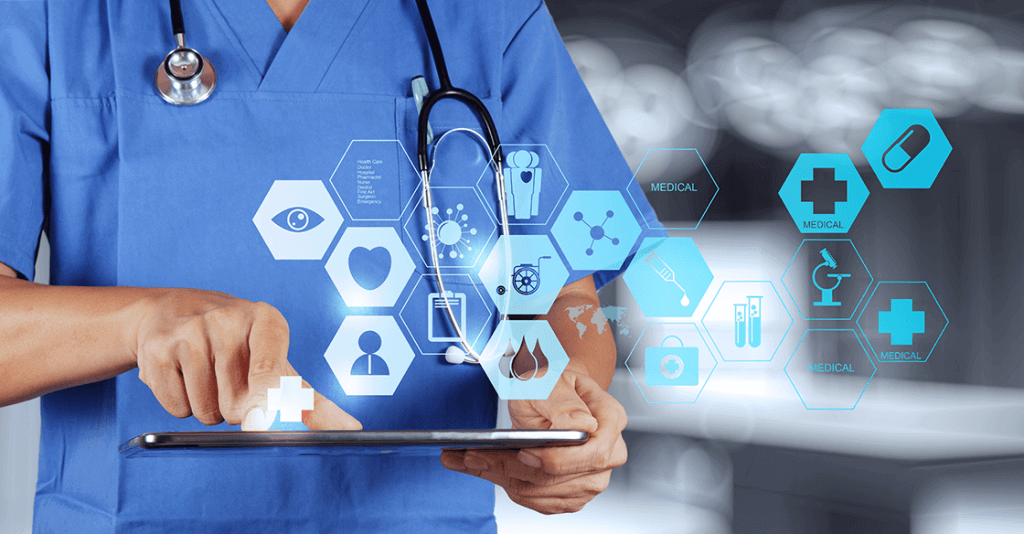

August 28, 2022
In recent years, healthcare has undergone a digital transformation. There has been a huge shift towards medical software development. This reposition has been driven by many factors, including the ever-increasing costs of care, the need for more efficient and effective care delivery, and the growing demand for patient engagement.
One of the most significant changes has been the adoption of electronic health records (EHRs). EHRs are medical software systems that capture and store patient data electronically. They provide a number of advantages over paper records, including improved accuracy, easier accessibility, and better portability. The other one we see is the EMR, electronic medical record, which is being used extensively. A patient’s medical record is effectively converted to digital form in an EMR. Clinicians can track data, determine patients’ health state, and evaluate it using these digital charts.
The use of EHRs and EMRs is just one example of how digitization is changing healthcare. Other areas where digitization is having an impact include telemedicine, medical device connectivity, and population health management.
When we talk about digitization in healthcare, we are referring to the use of digital technologies to improve the delivery of care. This can take many different forms, such as the use of medical software development or the development of new mobile apps. Patients can use these to track their own health. Digitization in healthcare is often seen as a way to improve efficiency and quality, while also reducing costs. In many cases, it is thought that it can help to make healthcare more accessible and convenient for patients.
For example, medical software can allow patients to book appointments and order prescriptions online. In addition, digitization can help to free up time for healthcare professionals, by automating some of the tasks that they would normally have to do manually. Ultimately, digitization in healthcare is all about using technology to make the delivery of care easier and more efficient.
One of the most important aspects of digitization in healthcare is the way it helps to improve patient care. When medical records are digitized, they can be more easily shared between different members of a patient’s care team. This means that everyone will have access to the same information, and there will be less room for error. In addition, digitization can help to streamline the process of scheduling appointments and ordering tests.
EHR offers many advantages, including better patient care and business process automation. EHR also enables rapid and remote doctor communication, guaranteeing that every practitioner working with a patient has access to an accurate, trustworthy, and thorough file. EMRs can be used to create patient portals that give patients access to historical medical information like lab and diagnostic test results, medications, and more. By sharing notes, instant messages, and even video chats, patients and doctors may communicate.
Patients will no longer have to wait for their records to be mailed or faxed. They can be confident that their information is accurate and up-to-date. Ultimately, digitization in healthcare has the potential to greatly improve the quality of patient care.

In recent years, digitization has revolutionized many industries, and healthcare is no exception. Medical software development plays a crucial role in digitization by creating custom applications that can streamline various processes and tasks. For example, it can help to reduce paperwork and data entry errors. It can improve communication between different departments within a hospital or between different hospitals. In addition, medical software’s such as EHR and EMR can help to provide patients with access to their medical records. This can empower them to make more informed decisions about their care. As digitization in healthcare continues to evolve, medical software development will become even more important in ensuring that hospitals and other healthcare organizations are able to keep up with the latest changes.
While digitization offers many potential benefits, such as improved access to care and increased efficiency, it also poses some challenges. One of the biggest challenges is ensuring that patient data is accurate and up-to-date. Another challenge is protecting patient privacy and security, as digitized health data is particularly vulnerable to hacking and identity theft.
Finally, it can also lead to provider burnout, as doctors and nurses may feel overwhelmed by the constant flow of information. Despite these challenges, digitization, especially custom medical software development is essential for improving the quality of healthcare. By working to overcome these challenges, we can ensure that everyone can benefit from the advances of digital technology.
Point-of-care, or just physical location, is the other significant change in healthcare. One of the major themes in the global response to the COVID-19 outbreak has been how digital technology may keep us connected despite physical distance. Healthcare professionals may interact directly with their patients thanks to digital health, no matter where they are. The point-of-care becomes the patient themselves thanks to remote patient monitoring (RPM) technologies, and other components of digital healthcare. This results in new opportunities for the how, when, and where of these interactions while also shortening the distance between the patient and the healthcare provider.
After EHR and EMR we have the AI revolution coming up. Simply said, AI is among the most effective independent innovation generators and emerging competence in the healthcare sector. This highly personalized treatment is made possible by the analysis provided by AI and machine learning when specific courses of action are suggested or automatically adopted based on continuing patient monitoring and compliance, for example, via participation with a digital health monitoring platform.